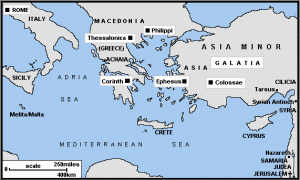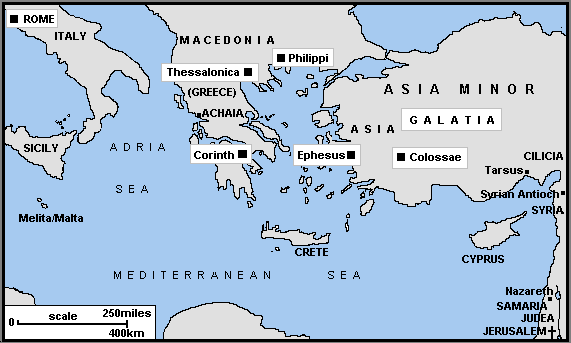From Acts 11-13
 In Antioch we see the first Gentile church. Barnabas and Saul come in to teach a large and growing church. It was at this church that believers first were given the name ‘Christians’. Who called them ‘Christians’? Why do you think they were called ‘Christians’?
In Antioch we see the first Gentile church. Barnabas and Saul come in to teach a large and growing church. It was at this church that believers first were given the name ‘Christians’. Who called them ‘Christians’? Why do you think they were called ‘Christians’?
This post is part of my bible in a year series.
Passage and Comments
Today’s passage continues the story of the persecution following Stephen’s murder. A great many believers were scattered. This only served to increase the spread of the gospel.
19 Now those who were scattered because of the persecution that arose over Stephen traveled as far as Phoenicia and Cyprus and Antioch, speaking the word to no one except Jews.
20 But there were some of them, men of Cyprus and Cyrene, who on coming to Antioch spoke to the Hellenists also, preaching the Lord Jesus.
21 And the hand of the Lord was with them, and a great number who believed turned to the Lord. (Acts 11.19-21)

‘As far as Phoenicia, Cyprus and Antioch’. The persecution moved the believers great distances away from Jerusalem. They are heading further away from the main center of Judaism into Gentile territory.
‘Speaking the word to no one except Jews’. Those who were scattered found it easier to speak about Jesus with their own kin. It’s probable they went to other synagogues. These other Jews had not heard about Jesus and those scattered probably felt it was safe to share their faith.
‘Spoke to the Hellenists also’. But some were bold enough to venture out of their comfort zones and speak to Hellenists. Greek Gentiles who were possibly interested in Judaism.
Are you willing to go out of your comfort zone to share the good news?
‘Preaching the Lord Jesus’, ‘a great number believed and turned to the Lord’. The Lord was with them and the church grew in size. These new Gentile believers were based in Antioch.
The news of this spread down south.
22 The report of this came to the ears of the church in Jerusalem, and they sent Barnabas to Antioch.
23 When he came and saw the grace of God, he was glad, and he exhorted them all to remain faithful to the Lord with steadfast purpose, 24 for he was a good man, full of the Holy Spirit and of faith. And a great many people were added to the Lord. (Acts 11.22-24)
‘They sent Barnabas to Antioch’. Hearing what was happening the leaders of the Jerusalem church – James, Peter and John wanted to check out what was happening and see if God was working.
‘Saw the grace of God’. When Barnabas came to Antioch and saw all the new believers he could tell God had worked. A new community of believers. Faith in Jesus is a sign of God’s grace.
When you go to church and see all the people do you see God’s grace?
‘He exhorted them all’. Barnabas is clearly a godly leader and God is working in him. He encouraged the church to remain faithful to God. His actions are a demonstration of his character and what he values as important. Consequently the church prospered and many more were added.
25 So Barnabas went to Tarsus to look for Saul, 26 and when he had found him, he brought him to Antioch. For a whole year they met with the church and taught a great many people. (Acts 11.25-26)
‘Went to Tarsus to look for Saul’. Barnabas is a capable leader and the church has already responded to him well. Barnabas is also known as a great encourager. He seeks to involve Saul in his gospel ministry. He finds Saul in Tarsus. Saul drops what he was doing and they go to Antioch. They both work together teaching a great many people.
And in Antioch the disciples were first called Christians. (Acts 11.26)
‘Were first called’. They were called ‘Christians’ by the unbelievers around them. They didn’t give the name to themselves. Two important questions.
- What does ‘Christian’ mean?
- Why were they called ‘Christians’ by unbelievers?
‘Christ‘ is the Greek equivalent to the Hebrew term for Messiah. The promised Davidic king who would usher in the kingdom of God and restore God’s people. The ending -ianos is found appended to a number of Latin names, indicating “the followers of” the person named. Followers of Christ.
The members of the Antioch church constantly talked about Christ. Consequently they were called Christians.
“The Christians themselves apparently did not appreciate the name, but, like many other nicknames, “Christian” stuck. It appears only three times in the NT:
- Acts 11:26 describes its origin;
- Acts 26:28 records Herod Agrippa II saying satirically to Paul, “In a short time you think to make me a Christian!”;
- 1 Peter 4:16 instructs believers not to be ashamed if they suffer because the name has been applied to them.
No further record of the name appears until the 2nd century.” (Elwell, W.A. & Beitzel, B.J., 1988. Baker encyclopedia of the Bible, p.432.)
About Mission
Today’s passage has a huge challenge for us. In Antioch the disciples were first called ‘Christians’. While the name initially was not appreciated by the early believers it was actually very big compliment.
Based on what you and your church constantly speaks about before unbelievers – Do you think those unbelievers would call you Christians? Or would they call you something else?
The believers in Antioch were constantly calling Jesus the Christ. They would have talked about him as the Christ all the time and in public for them to get this nick name. They would have constantly explained the significance of Jesus being the Christ. They would have shown from Jesus’ fulfillment of Old Testament prophecies that he was the Christ. This is what the early Christian’s did.
I think I would fail this test. How would you go? How would our churches go? How can we change so that when unbelievers think of us they think were ‘people who talk about Christ all the time’.
Copyright © Joshua Washington and thescripturesays, 2016. All Rights Reserved.


